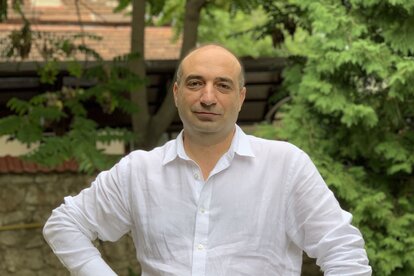In Moldova, farmers and businesses are facing difficulties and increasing pressure due to the coronavirus pandemic. The most likely and indeed justified response in such cases is saving lives and supporting short-term humanitarian efforts. Many ad hoc measures may be required to address the economic fallouts from the pandemic. The challenge often, however, is the lack of attention to a crisis in a more systematic way with a medium to long-term perspective. This is where the OPTIM project in Moldova saw an opportunity to meaningfully contribute to minimizing the impacts by searching for innovative solutions in the food systems.
**********
The coronavirus pandemic is ripping through countries. It remains a health and humanitarian crisis, but the economic impacts are also serious. Economic contagion is now spreading as fast as the pandemic itself.
Moldova isn’t an exception. The government has declared a two-month state of emergency on March 17. The country has high migration and remittances, which despite their long-term negative impacts, have contributed to temporarily supporting livelihoods in the country. People are now coming back to Moldova, most losing their jobs in the countries where they have been working, and others to be closer to their family members.
Among others, the agriculture sector in the country, one of the largest, is bearing the brunt of the coronavirus pandemic. More than 55% of the Moldovan population resides in rural areas and more than half of the rural population is involved in agriculture. So far, the agriculture sector is showing its resilience and continues to provide the population with food, income and jobs. Yet, farmers and businesses are facing difficulties and increasing pressure.
Disrupted markets
Before the coronavirus pandemic, there were good signs of increasing demands for agricultural products in Moldova. While there is currently an overproduction of fruits like grapes, a big part of the vegetables consumed domestically are imported. As in many countries, Moldovans are proud of their domestic products, which presents a clear opportunity for the sector to sell to domestic customers.
Moldova has very favorable soil and climate conditions for the production of high-quality agricultural products, which certainly is one of the major strengths of the sector. There are some well-established value chains like dried fruit or wine with some strong businesses, and there is an emerging trend towards using organic production practices.
The first Farmers’ Market started in June 2018 which is part of an emerging trend in stimulating demands. Over 40 small-scale producers sell directly to the public. The Market specializes in organic and artisan products grown and processed locally and is run on a not-for-profit basis.
The state of emergency has limited food supplies. This means that it affects markets, malls, and restaurants, except for grocery stores, pharmacies and petrol stations. With the imposed restrictions, the Market had to close for the unforeseeable future. The closure of the Market can be existential for most people -- it's an economic backbone and many food producers have already lost their only source of income and have less means to cope with.
The closure of the Market is a serious problem because it also disrupts a complex web of interactions among producers, inputs providers, transportation agencies, processing plants, etc. Restrictions and quarantine measures are limiting farmers’ access to inputs and output markets, reducing productive capacities and denying a point of sale for produce.
Looking for ways to respond – stepping up the ‘digital game’
Under the current circumstances, it’s hard to predict how long the state of emergency will last for. Food producers face an extremely difficult situation. An alternative solution is to search for ways to sell their products. Producers feel that the only way to survive is by organizing themselves and selling online via a common platform. This is where the Association of Organic and Artisan Food Producers and Consumers of Moldova (EcoLocal) comes in.
Mitigating the impact of this severe shock requires providing support to those hit the hardest and the most vulnerable. Therefore, as the first step, EcoLocal assesses the level of impacts and selects those who have lost their sales almost entirely as they only sell through the Market.
Immediate action is critical, but it’s also important to build on what the OPTIM[1] project of the Swiss Agency for Development and Cooperation (SDC) is doing and embrace a medium to long-term agenda. Digital technologies have become more crucial than ever before due to the coronavirus pandemic. So, the next step is moving to online marketing. In addition to the agriculture sector, OPTIM works in the Information, Communication and Technology (ICT) sector. This means that OPTIM didn’t need a steep learning curve to move quickly – to work remotely but also to change the way of doing business.
OPTIM has supported EcoLocal to develop the online food delivery services based on EcoLocal’s infrastructure. EcoLocal has employed staff and it has IT infrastructure, branding and a strong customer base. There are 70 small producers and more than 6,000 potential clients. Online platform (online payment) for shopping is a centralized process, administrated by EcoLocal. ‘This service is vital for us’, says Nadejda Gori, a vegetable grower. ‘We had invested a lot in seasonal produce and without current deliveries we would have enormous losses in our business.’
Of course, ‘this isn’t that simple,’ adds Tamara Schiopu, President of EcoLocal. One challenge Tamara sees is the toughening of the restrictions by the government and the fact that competition has exploded because everybody wants to do the same. ‘We need to be innovative, for example, by stressing the convenience factor of our services, such as 10 - 15 products in one click, and the freshness and personality factors.’
The missing function to make the online delivery work was the logistics. Under the current circumstances, EcoLocal needed to react to the situation and be able to pay for materials they urgently needed to make the logistics work and pay some staff. They have now put in place storage (collection centers), transportation and delivery scheduling. Orders are collected until Wednesday and producers receive the orders from EcoLocal. Producers deliver on Thursday the packed goods and Friday the fresh goods. Every Friday, all the boxes are assembled at the warehouse and delivered to homes.
EcoLocal and OPTIM will test the online delivery services for the next three months. At a later stage, they’ll evaluate the results and assess whether the model can sustain beyond the current crisis. OPTIM and EcloLocal moved fast by shifting capacity and investments to digital to able to mitigate the impact of the pandemic and keep businesses running now, and in the long term. OPTIM and EcoLocal will monitor and learn if this pilot will be able to show whether there is a potential for scaling up of shifting the supply of fresh foods as well as fruits, vegetables, bread, tea, honey, beans, maturated cheese to online.
Conclusion
The road to recovery requires concerted and coordinated efforts, and people and businesses need extended support far more than immediate, life-saving initiatives. This is what we learned from the 2013/14 Super Typhoon Haiyan in the Philippines, the 2014 Bosnian floods, the 2019 Albanian earthquake of 2019, the ongoing Rohingya Refugee Crisis in Bangladesh, to mention a few. However, the effects of the coronavirus pandemic are unprecedented, not yet foreseeable and are unfolding continuously.
As development practitioners, we need to be conditioned for any changes or disruptions that come our way. All crises have led to a shift in the mode of production and interaction. This is simply adaptive management in practice. Rather than enthusiastically pouring resources – giving money, buying equipment, etc. – and creating parallel structures and dependency, the OPTIM project in Moldova is building on what it has been doing and tapping into existing opportunities in the time of coronavirus pandemic.
Related readings
- “Wine Is Food, Not Just Alcohol,” Says Moldova. But How Can It Stimulate the Agricultural Sector?
- Four Knotty Issues for Tying & Strengthening the Humanitarian–Development Nexus
[1] Implemented by Helvetas with its partners – the Moldovan Chamber of Commerce and Industry and Mesopartner




